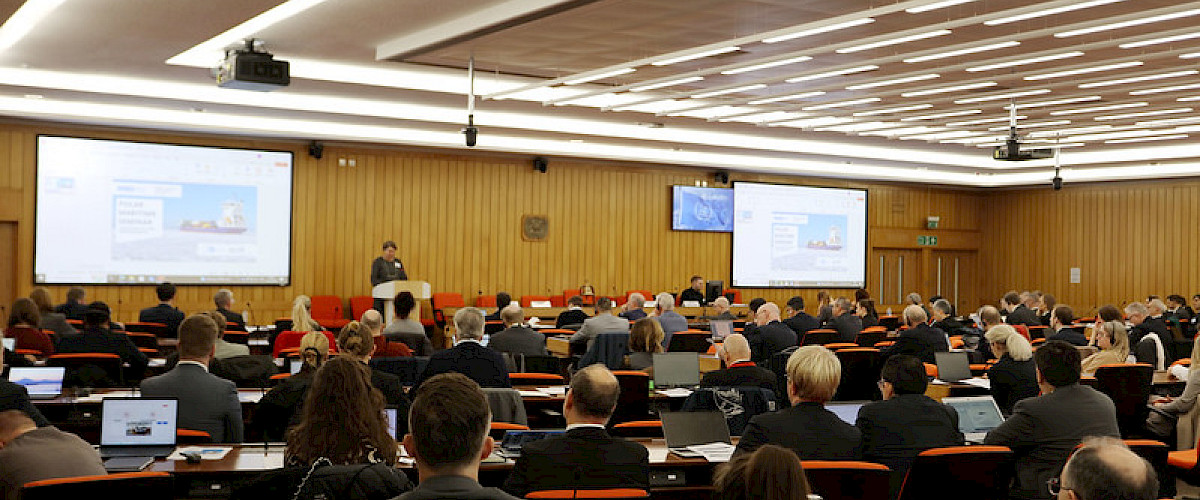
‘2025 Polar Maritime Seminar at IMO Headquarters, London, a huge success’
 Press Release 24 January 2025
Press Release 24 January 2025
Wide-ranging agenda on Polar specific measures discussed at Seminar jointly sponsored by IMO and Norway’s Chairship of the Arctic Council, in cooperation with the Arctic Council’s Working Group on the Protection of the Arctic Marine Environment (PAME).
Today, the IMO and Norway's Chairship of the Arctic Council, in cooperation with the Arctic Council’s Working Group on the Protection of the Arctic Marine Environment, concluded the ‘2025 Polar Maritime Seminar’. Over 200 participants representing nearly 100 different States, entities and organizations gathered at IMO Headquarters in London for two days of discussion on a wide range of topics related to maritime activity in the Arctic and Antarctic.
The event was designed to provide an update on Polar shipping developments, and a chance to share information on international efforts to support Polar shipping to become safer, greener and more sustainable. Sessions across the two days covered trends in Arctic and Antarctic vessel activity, voyage planning, search and rescue, polar waters training, POLARIS, underwater radiated noise, pollution control measures, and fishing vessel safety.
Dr. Heike Deggim, the International Maritime Organizations’ Director of the Marine Environment Division, says: “Building on the success of the 2022 Polar Maritime Seminar, which resulted in deepened cross-collaboration between both Polar Regions this seminar has been a huge success. The seminar highlighted very important issues for the safety of life at sea, and the protection of the polar Regions’ pristine environment, and in respect of the Arctic, its people, with 200 attendees. IMO recognizes through this success the importance of working with the Arctic Council to achieve these objectives, and in particular in this instance with Norway and the Protection of the Arctic Marine Environment Working Group.” See also: Opening address for the seminar by Heike Deggim.
Addressing the Seminar, Ms. Siv Christin Gaalaas, Specialist Director, Norwegian Ministry of Trade Industry and Fisheries said: “It is our obligation as responsible coastal and flag states to balance the opportunities the oceans provide us with and at the same time protect the marine environment in the vulnerable Polar areas. Promoting safe and sustainable shipping in Polar areas is a challenge we must continue to meet collectively and collaboratively through effective international cooperation. The Polar Maritime Seminar, co-hosted by IMO and Norway as chair of the Arctic Council, has proved to be an exceptional platform for relevant stakeholders to come together to share experiences and best practices, and advance safe and sustainable shipping in Polar areas.”
Links:
o Pictures from the Seminar (free for use)
ENDS
For additional information about the Polar Maritime Seminar, please contact: polarseminar@imo.org, or pame@pame.is.
About the International Maritime Organization
The International Maritime Organization is a specialized agency of the United Nations which is responsible for measures to improve the safety and security of international shipping and to prevent pollution from ships. It is also involved in legal matters, including liability and compensation issues and the facilitation of international maritime traffic. It was established by means of a Convention adopted under the auspices of the United Nations in Geneva on 6 March 1948 and met for the first time in January 1959.
About the Arctic Council
The Arctic Council is the leading intergovernmental forum promoting cooperation, coordination and interaction among the Arctic States, Arctic Indigenous peoples and other Arctic inhabitants on common Arctic issues, in particular on issues of sustainable development and environmental protection in the Arctic. It was formally established in 1996.
The members of the Arctic Council are the eight Arctic States and the six Indigenous Permanent Participant organizations. There are six Working Groups within the Arctic Council, each of which focuses on a particular set of issues for the Arctic Council. In addition, the Arctic Council has more than 35 Observer States and organizations.
About PAME
PAME is one of six Arctic Council Working Groups. PAME is the focal point of the Arctic Council’s activities related to the protection and sustainable use of the Arctic marine environment and provides a unique forum for collaboration on a wide range of activities in this regard.
####
 Arctic Council Working Group
Arctic Council Working Group